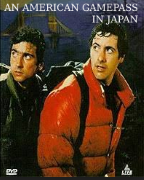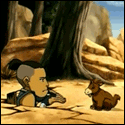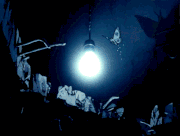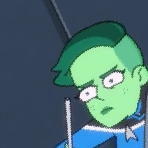|
I posit that the distinction between "soft" and "hard" fiction is arbitrary and cannot be derived from the text alone, but depends on knowledge of how much "work" the author claims to have put in to research the stuff they write about. Well consider that Dan Brown does a shitload of "work" but no one would dare to suggest he writes hard sci-fi or whatever, mainly because his audience is different and it's easy to find fault with said work (even though it's often equally easy to find similar faults in purported hard fiction). And here we come to the crux of the matter: Despite proponents of the distinction regularly claiming that it's not a distinction of quality, it clearly is. Fans will often say they prefer hard sci-fi because it's more "intellectual" or similar thinly veiled derogatory opinions (the implication being then that soft sci-fi is not intellectually stimulating). You'll have Trekkies claiming Star Wars is beneath them (though some add that they can still "enjoy" it occasionally) because it's not "hard" ie. "based on science" and thus not to be taken seriously, but then you have fans/members of the Orion's Arm community saying the exact same thing about Star Trek, while both of them being no less scientifically preposterous than Star Wars. In fact you can make the argument that by being silent on how exactly things work, Star Wars is at least not in open contradiction to current science, and if you further claim that Lucas secretly "did the math" according to science current at the time suddenly it's hard sci-fi. The above method is how Lord of the Rings becomes "hard fantasy"; by reading a bunch of extra material you find out that Tolkien had a large worldbuilding project, while the actual text is pretty hard to distinguish from any half-decent fantasy-tome with a map and glossary, but whose author has not been given exalted status. By the same reasoning The Hobbit should be also considered hard fantasy, and yet it never is, because it's clearly a children's book and thus not to be taken seriously, ergo it is a claim of quality here too as in sci-fi. You see people say that A Song of Ice and Fire is hard because the characters don't have plot armor and die all the time (except of course when they do and don't), but doubtful if anyone would say the same for something like The Animals of Farthing Wood. In conclusion, the distinction between
|
|
|
|

|
| # ? Apr 25, 2024 10:31 |
|
I feel like a big part of hard sci-fi isn't just the author doing the research but having the story revolve around the stuff they did the research on. (often because it's the research that inspired the story in the first place) LotR as 'hard fantasy' seems pretty fitting, even despite or maybe because of its deliberately mythic overtones. Hard sci-fi wants you to remember what the rules are, soft sci-fi doesn't give a poo poo about the rules and neither should you.
|
|
|
|
Many (if not most) authors actually do a ton of research on the stuff they are writing about. How do you distinguish some random hard sci-fi author running some numbers to Dan Brown traveling across Europe looking at various pieces of architecture? Arguably the latter involves more actual work.
|
|
|
|
Dan Brown isn't writing sci-fi for one, unless he's changed tack dramatically in the last 15 years. Hard vs. Soft sci-fi comes down to "is it using magic [y/n]?", everything else is tedious nerds bellowing at each other on internet forums and should just be ignored.
|
|
|
|
Mooey Cow posted:I posit that the distinction between "soft" and "hard" fiction is arbitrary and cannot be derived from the text alone, but depends on knowledge of how much "work" the author claims to have put in to research the stuff they write about. Well consider that Dan Brown does a shitload of "work" but no one would dare to suggest he writes hard sci-fi or whatever, mainly because his audience is different and it's easy to find fault with said work (even though it's often equally easy to find similar faults in purported hard fiction). I sometimes see "hard sci-fi" used negatively just as much as positively, honestly; it's often asserted that hard sci-fi pays insufficient attention to characterization, is incomprehensible to people without the right academic background, or so forth. I would argue that the distinction between "hard sci-fi" and "soft sci-fi" isn't scientific accuracy, but whether the work implicitly asks to be judged by its scientific accuracy. Star Wars is clearly very soft sci-fi, whereas Star Trek is often just bad hard sci-fi.
|
|
|
|
Critiquing Star Trek for the science still feels like missing the forest for the trees to me. It's an aesthetic flourish for a series that's more about ethics and philosophy.
|
|
|
|
Do the greek gods ever show up again in the later Treks?
|
|
|
|
Some Goon posted:Do the greek gods ever show up again in the later Treks? I don't think so, but other gods do. DS9 is all about verifiable gods existing outside of time and space. (Gets rather interesting actually, given how much their appearances revolve around the idea of negotiating with beings very different from you) Still amused that the idea could just as validly apply to fantasy, though I think it's often more seen as 'high' and 'low' fantasy; high fantasy where magic is all over the place, enchanted swords are common, shining cities are a thing and wizardry is at least a distinguished career, low fantasy where magic is rare, poorly understood and distrusted, and things are generally more gritty dark ages with poo poo-covered peasants and cities are stinking hives. (and similarly, it's a pretty blurry and arbitrary distinction at the best of times that's more tone and themes than specific content) Even most soft sci-fi has rules that it mostly sticks to and occasionally brings up technobabble, both Star Trek and Star Wars do that implicitly and explicitly at times, just Star Trek has characters who are scientists and engineers as an excuse to come up with solutions to problems of the week.
|
|
|
|
The hard sci-fi to soft sci-fi thing is a continuum, a digital distinction rather than an analog one. Lets imagine a scenario where a writing prompt is sent out and four responses from across the spectrum are sent back. The stories submitted must have these three things in common: 1: The protagonists start on Earth 2: The villains are punched on Luna 3: The villains are Nazis Submission A features a group of young adults working with their Uncle, an atomic engineer. Uncle has devised a new engine with a unrealistically energetic fuel. The ridiculous mass ratio allows for a single stage rocket design, won't make this post longer by copy pasting the math and its tricky formatting. This makes a rocket capable of landing on the moon a feasible project for the protagonists. Much arguing about what to bring in their limited weight allowance. Compasses, slide rules, sextants and more are utilized in their journey to the moon, equations are provided for those who want to follow along at home. Nazis are already there and a fist fight ensues when the two groups encounter each other during suited moonwalks. Rocket Ship Galileo, on the nose Submission B features two British toffs. One of them wants to write a play in the peaceful seclusion of the countryside, the other has invented a new material that has a negative mass when an electric current passes through it. They get into an argument about whether life exists on the moon. They both strap on backpacks of the negative mass material and stand with the moon directly above them, this takes a boat ride or two. Next they float straight up to the moon. Intelligent life does exist on the moon, but has been taken over by Nazi SA members fleeing Hitler. A fistfight breaks out over the favors of a female Selenite. adaptation of The First Men in The Moon Submission C starts with Donald Trump winning reelection. NASA is told to go the moon before the next presidential election or be disbanded. So they refurbish Apollo Project rockets, landers, etc. for an exact recreation of the historical moon landings. The president insists on a top supporter taking the final journey, who is "coincidentally" a descendant of Wernher von Braun. As the final landing approach is made the supporter makes a move for the airlock, planning to livestream the first person to hop out of a moving spacecraft onto the moon. This would be a disaster, so a crewwoman fights to stop them. The fistfight continues even as the landing finishes. channeled my inner Clive Cussler Submission D has Dante learn that the Moon is the first Sphere of Heaven. It is inhabited by those souls who abandoned their vows and were generally lacking the virtue of fortitude. He insists that Beatrice take him there, that he may know who dwells there. There he finds Vidkun Quisling. Plot twist: In this version Dante is from the present and immediately starts punching Quisling for his crimes against humanity. Much bewailing of the failings of gods judgement ensue. Loosely based on the divine comedy Okay, ran out of time to find/make good examples. But I hope you get the idea that the hardness/softness thing is a scale, not an on/off switch. The extremes on either end stop being science fiction and start being political thrillers or fantasy.
|
|
|
|
I feel a common thing in 'hard' sci-fi is that the author does a lot of research and thought on scientific stuff, and things that DO break the rules and/or are highly extrapolated from current technology are specifically pointed out. The Road Not Taken comes to mind, an interesting example where the idea is aliens who've discovered the secret to antigravity and spaceflight- with the twist that it's something you could possibly stumble upon in the Stone Age, but so illogical that you'd never figure it out with the scientific method, and so most species that discover it have the rest of their science and technology stagnate.
|
|
|
|
Would you consider Interstellar hard sci fi?
|
|
|
|
Hard sci-fi is so called because it is hard to read.
|
|
|
|
Jiminy Christmas! Shoes! posted:Would you consider Interstellar hard sci fi? Do you consider 2001 A Space Odyssey to be a harder science fiction? I would consider Interstellar one gradation harder than that.
|
|
|
|
"Genre fiction" is a bullshit category invented by snobs to justify their own snobbery. There are only two kinds of literature: the sort that you* enjoy reading and the other sort. Hard/Soft SF is merely an attempt to apply the label within an already ghettoized segment. In related news, the new Warhammer Crime imprint is extremely good, if you're looking for a good cyberpunky-feel police procedural you could do far far worse than reading Chris Wraight's Bloodlines. *: "You" as in "You, personally" not "you" as in "one".
|
|
|
|
I prefer soft for visual medium, hard for print. It's much easier to explain FTL time dilation and things like that when you have a few pages to do so, rather than have some characters stand there and spew exposition at each other for two minutes.
|
|
|
|
SolarFire2 posted:I prefer soft for visual medium, hard for print.
|
|
|
|
Roth posted:Critiquing Star Trek for the science still feels like missing the forest for the trees to me. It's an aesthetic flourish for a series that's more about ethics and philosophy. It still makes me laugh that I grew up during the TNG/DS9/VOY era and heard about how Trek was the "serious" and "boring" franchise for adults where everything was plausible. Then in literally the first thing I ever see in TNG it's "Oh this is Q the magic space wizard who can do literally anything whenever he wants and no we can't pretend he doesn't exist 90% of the time because he's the reason the Hivemind Cyborg Zombies are involved in the series." That dissonance is a high I'll be chasing for the rest of my life. Some Goon posted:Hard vs. Soft sci-fi comes down to "is it using magic [y/n]?", everything else is tedious nerds bellowing at each other on internet forums and should just be ignored.  Trek still falls under "hard" for me because-- for the most part-- the main characters are treated as plausibly human. They have day jobs. They need to eat. They have to think about practical considerations, however nominally, like travel time and the blatantly magical stuff is either a quick plot resolution or something demonstrably "above" current understanding and not truly magic. And everything else really is just tedious nerds bellowing at each other.
|
|
|
|
mind the walrus posted:Trek still falls under "hard" for me because-- for the most part-- the main characters are treated as plausibly human. They have day jobs. They need to eat. That's true of plenty of soft sci-fi, and even fantasy, too. And there's also hard sci-fi where the main characters don't have day jobs, and even hard sci-fi where the main characters are robots or aliens.
|
|
|
|
I feel the distinction is a lot easier to grasp intuitively than it is to spell out. Compare these superficially similar stories: Story 1: The protagonist discovers what was thought to be coded military communications is actually a language which makes those who understand it susceptible to mind control. In the process, she has numerous adventures including chartering a space ship, flying to a distant planet, and being captured by space pirates. Story 2: The protagonist discovers what was thought to be computer code is actually a language which makes those who understand it susceptible to mind control. In the process, he has numerous adventures including piloting a boat, being taken aboard an aircraft carrier, and narrowly avoiding capture by sea pirates. The first story is Samuel Delany's Babel-17 and has all the tropes of hard scifi, and the second is Neal Stephenson's Snow Crash and you could pour it through a colander.
|
|
|
|
See, I consider both of those equally "hard". Snowcrash's tone is goofy and tongue-in-cheek, but the science underpinning its story is equally (im)plausible. And Babel-17 has all the strange and wondrous crew right out of space opera. I tend to think the two terms exist only to perpetuate stuff like petty arguments about whether Trek or Wars is better.
|
|
|
|
Babel-17 is kickass, but you are talking about a book where the helmsmen for ships audition for jobs through wrestling matches. Sensors are operated by ghosts, who hang out in their own necropolis district in spaceports. The main character is either a minor telepath or an empath. I know the navigation via marbles scene is cool and is hard sci-fi in a vacuum. But overall the hardness is in the same ballpark as something like star trek. Oh god, what have I become!
|
|
|
|
Schadenboner posted:"Genre fiction" is a bullshit category invented by snobs to justify their own snobbery. There are only two kinds of literature: the sort that you* enjoy reading and the other sort. Hard/Soft SF is merely an attempt to apply the label within an already ghettoized segment. Using a small phrase to describe the work in very general terms is useful for finding the type of work readers enjoy. For example, I tend to favor hard scifi, but not speculative hard because that's just tryin to bullshit magic back into it.
|
|
|
|
The entire 'scifi/fantasy' distinction is trash from the getgo. These (plus horror, alt-history etc) are all examples of speculative fiction. They project into the future or the past or into an alternate universe, whereas non-speculative fiction is usually clustered around some kind of representative realism. Speculative fiction is more interesting to me, because it has to try to construct a fundamental difference between the world we live in and its own universe. Realist fiction is mostly just gratuitous wish fulfillment that works by trying to simulate social consensus reality as closely as possible. Speculative fiction will have to contain a theory of history or an alternate metaphysical framework, and the relation between this theoretical framework and the reified ideology of this era of capitalist society is a space of imaginative freedom, a breath of fresh air that we can't get anywhere else. The 'hard/soft' distinction is the aesthetic expectations of representative realism invading the territory of the speculative imagination. It's useless because the second you enter speculative territory, you leave the expectations of realism behind. That's the whole drat point. e: there are of course, 'realist' examples of speculative fiction, but the categorial distinctions of sci-fi/horror/fantasy and 'hard/soft' are all done from within the hegemonic aesthetics and expectations of representative realism. By making a primary division before these distinctions, we can generate categories that are immanent to speculative fiction itself. We could make a grid of 'past/future' against 'science/magic', for instance, and leave realist distinctions where they belong. emTme3 fucked around with this message at 04:35 on Oct 10, 2020 |
|
|
|
nobody in space has a penis or any other form of erectile tissue
|
|
|
|
OK, but can someone explain to me the difference between strange and charm sci-fi?
|
|
|
|
Buttchocks posted:OK, but can someone explain to me the difference between strange and charm sci-fi? I think it has something to do with whether the book spins clockwise or counter when you yell “Oh come on!” and toss it into the corner? 
|
|
|
|

|
| # ? Apr 25, 2024 10:31 |
|
Buttchocks posted:OK, but can someone explain to me the difference between strange and charm sci-fi? its one of those things where the distinction really doesn't mean anything without the math background
|
|
|























